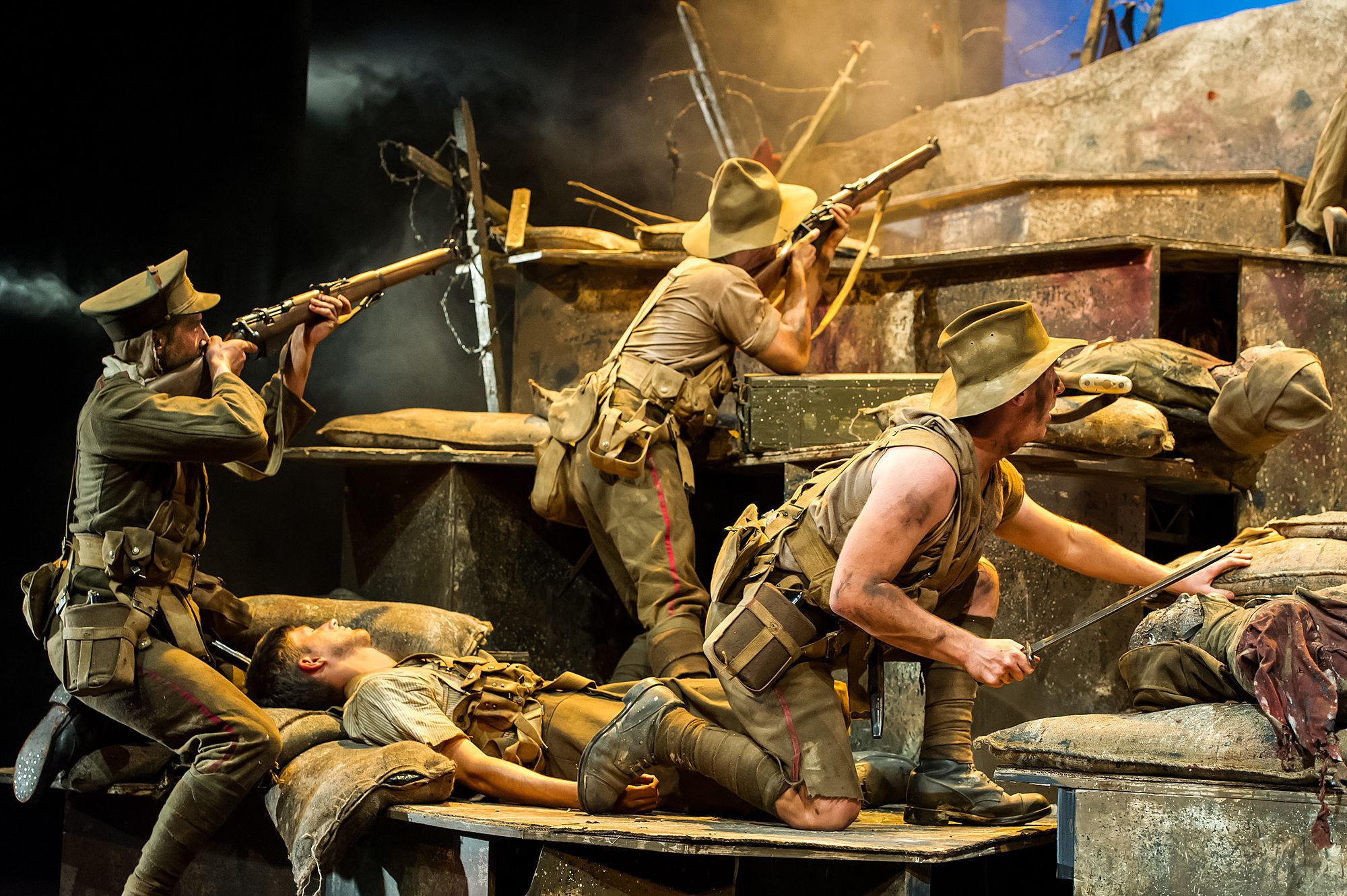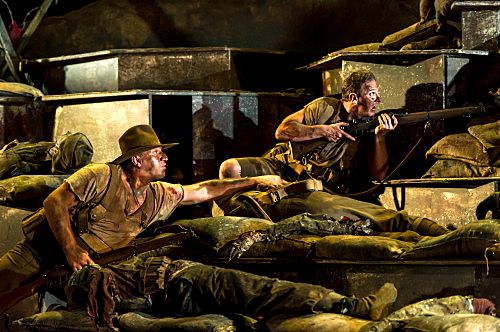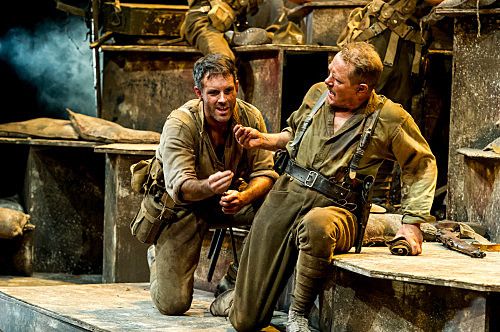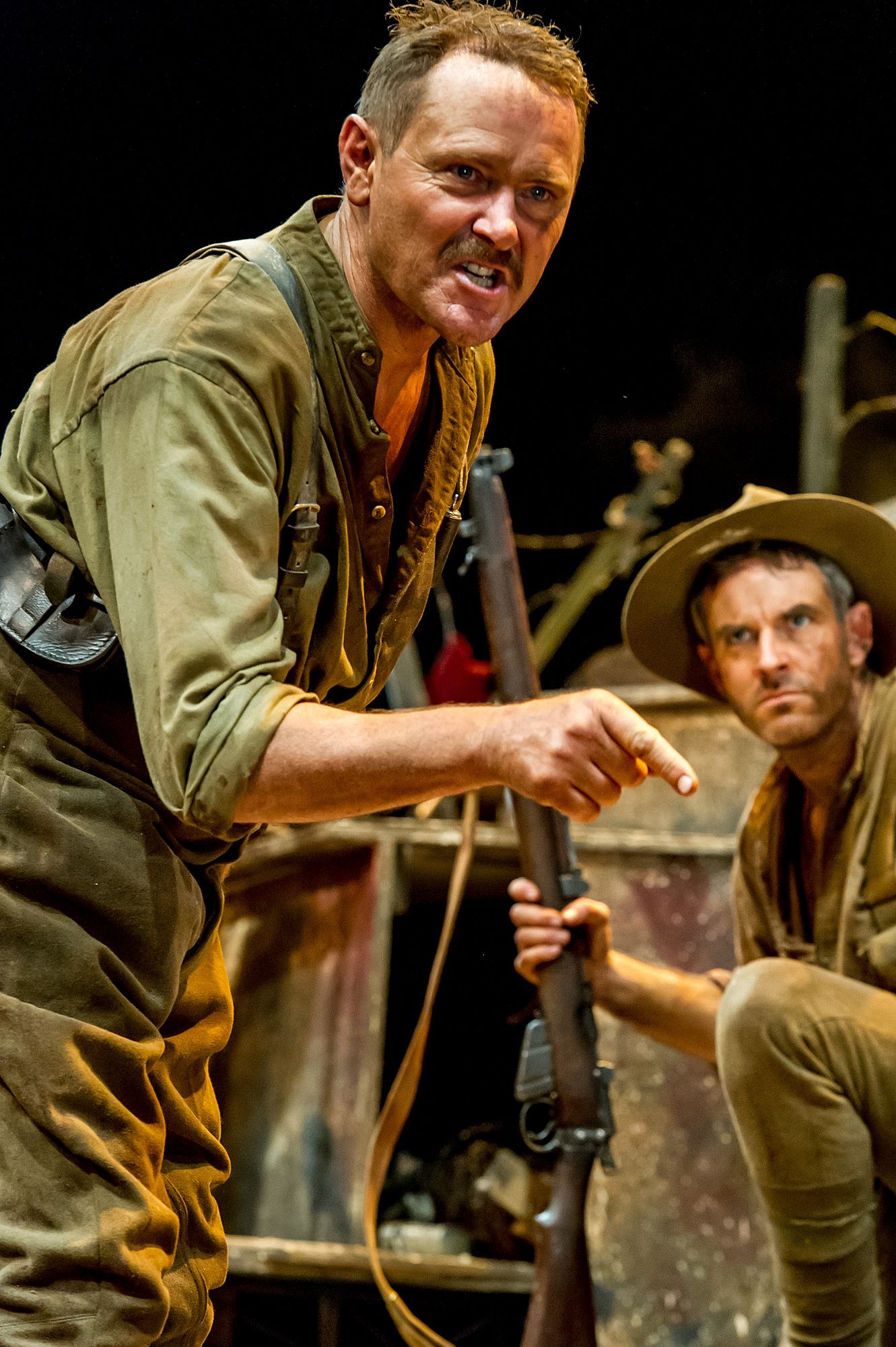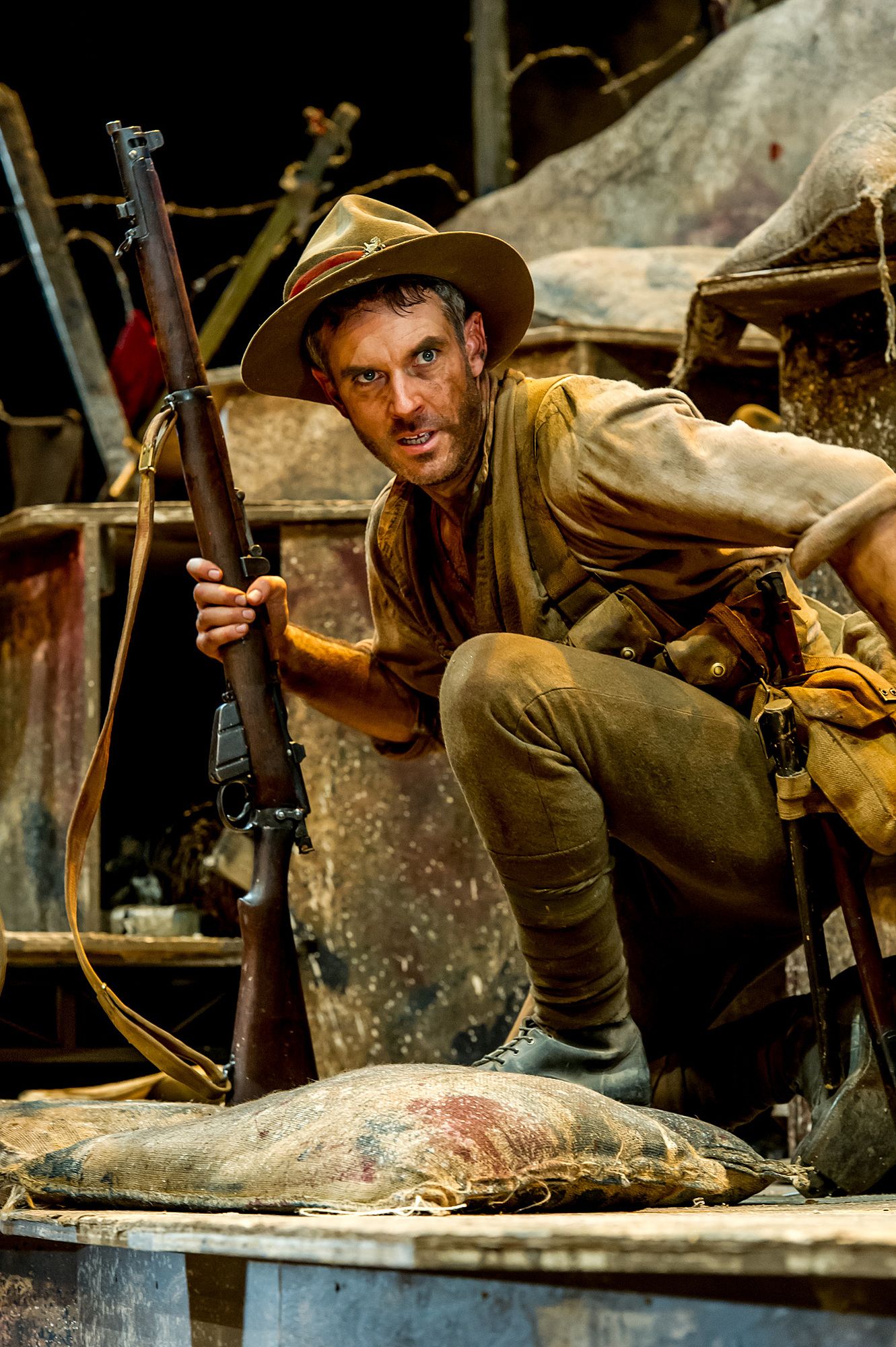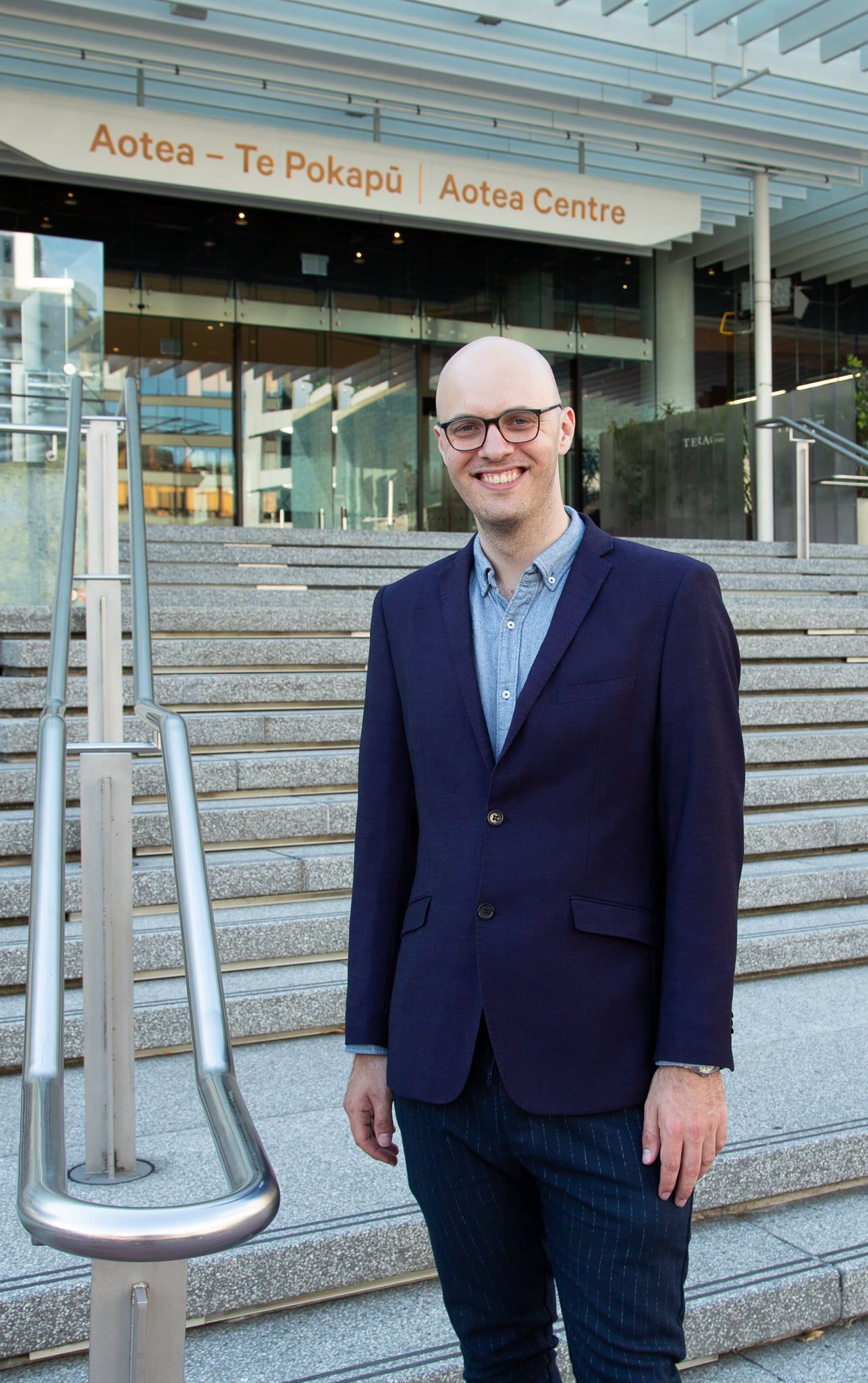The Folly of Myth-Making: Once on Chunuk Bair
James Wenley examines Auckland Theatre Company's production of Once on Chanuk Bair and asks: What is it remembering?
Andrew Grainger, Wesley Dowdell. Photo - Michael Smith
Colonel Connolly, despite a noticeable limp, bounds up the Chunuk Bair hill. It’s a mass of earthen rock, sandbags, and the odd corpse. I admit that I don’t notice the corpses till later, so much are they part of the war-torn landscape, not till Connolly puts the boot in and orders his men to clear them away. We know they’ll be new corpses soon enough to replace them. After months of trench-slog, they’ve reached Chunuk Bair, and the Dardanelles are before them. “Just like that,” says Colonel Connolly. “I wouldn’t call four months just like that. Or yesterday,” replies sergeant Frank, to which Connolly states: “But we’ve knocked the bastard off.”
Now that’s a line that jumps out at you. Perhaps it was a common enough expression in the 40s, but Sir Ed’s made it one for the ages. It’s a very clever insertion by Maurice Shadbolt, evoking the full history of Kiwi world-beating understatement. Shadbolt has cast Chunuk Bair, his only play, as the national tragedy, the crucible where the distinct Kiwi spirit was forged. The whole national story is performed on the hill, as Connolly invokes, “Colonize. Pioneer. Bash and Slash. Clear Chunuk Bair.” It’s a sobering and staggering story, 760 men from the Wellington Infantry battalion fought on Chunuk Bair while British reinforcements stayed put. 70 soldiers returned when the order to retreat was finally given. They left as British subjects, and died as New Zealanders. Lest we forget, we are urged at a certain time each year, but Auckland Theatre Company’s new production of Shadbolt’s 1982 play causes pause. What are we remembering?
The revival marks the Centennial of World War I, but comes to The Maidment a year too early to mark its own events that so scarred this nation’s history. Today, Anzac services are popular. There are those who like to claim it as the real national day, overseas battles and sacrifice simpler and easier to get behind then the bicultural infighting of Waitangi. Shadbolt’s positioning of the battle of Chunuk Bair, a “powerful argument for the birth of nationhood amid terrible adversity” as director Ian Mune put it, is a widely accepted myth today. Shadbolt’sBair, performed again in 1989 and adapted into a film in 1991 (starring Robert Powell), may have played some part in this. The first production was performed under a very different landscape, as Michael Neill writes in his ACT (the long-defunct New Zealand theatre magazine) review of the original production, the Anzacs had “began to seem an embarrassing relic of the colonial past.” Indeed, Shadbolt had been writing following a time when “Gallipoli ha[d] been virtually censored from our literature.” Once on Chunuk Bair is a play for that era, an attempt to re-gild a “legend tarnished by the decay of an imperial ideal.” And so Shadbolt sets out to replace cringing colonialism with the myth of national identity and pride which defines Anzac remembrance today.
An advertisement in the ATC program offers a “special charter cruise from Athens to Istanbul”, where you too can see Gallipoli in comfort and style. The pilgrimage to the peninsula next year is expected to be oversubscribed. The Anzac myth has captured a new generation, but there’s a fine line between remembrance and glorification. It's simplified, made palatable for charted cruises. The TV movie Field Punishment No 1 was a recent critique, making heroes of the objectors forced to go to war. You’d have thought it would be perfect for TV One at primetime on Anzac Day, but not so: it was too “deliberately provocative”, instead screening on April 22nd. What are the narratives we tell ourselves about Gallipoli? We don’t glorify the war itself, but we want those lives lost to mean something, to be more than just casualties in the war of the former motherland. And so in the attempt to create meaning, the narrative of nation building takes hold. Bair shows the folly of war, but might it also show us the folly of myth-making?
*
In Field Punishment, Byron Coll was cast as one of the objectors forcefully shipped off to war but who still refused to fight once on the frontline. Bravery, or cowardice? In Chunuk Bair Coll plays a linesman, Bassett, so keen to get into the army that he kept trying after twice failing to make the minimum chest measurements requirements, only sneaking in “third time lucky” as “the doctor was drunk and the measuring tape was lost.” Under heavy fire, Bassett makes it to the Bair (“I just sort of kept going”) and sets up a connection between the Fernleaves and the British commanders. When the line is cut, Bassett goes back into the fire to fix it. Connolly accuses him of trying to be a hero; “bloody well own up.” Bassett says it’s his job, and what’s the use, “unless you take an interest.” What are to make of this act? Bravery, or sheer bloody mindedness? Now that’s the big question. History has judged Bassett the ultimate heroic soldier, the Willie Apiata of WWI, he received the only NZ VC recognition from the Gallipoli campaign.Bassett in Bair is eulogised instead as the good Kiwi bloke who gets on with the job, no different than the other Fernleaves who head towards enemy fire.
[caption id="attachment_9731" align="aligncenter" width="500"] Kevin Keys, Stephen Lovatt. Photo - Michael Smith[/caption]
Under The Maidment houselights, John Verryt’s Bair stage looks rather unreal – wooden platforms jutting out at angles on a steep rise, ordered to look chaotic. It’s also rather compact, rising below and above, but not outwards. It’s isolated, marooned in the middle of the theatre’s stage. A mound of earth carefully cut out and placed where it doesn’t belong. The lights dim, and we’re transported to another time. Shadbolt’s script opens with “Ships’ horns. Patriotic cheering; flutter of martial music.” In this production, they’ve snuck in an extra sound effect: the baaing of sheep. Sheep. That cliché.It’s almost comical to hear them. It’s a bit on the nose, but that cliché finds new meaning here. Lambs to the slaughter. Following orders. Sean Lynch’s lighting state focuses on the top of the mound, where the Dardanelles are etched on the horizon. Just as Porky will look over the Chunuk Bair crest and sees a “big bloody fat river… like the Wanganui”, we see and hear New Zealand. Then it opens to Gallipoli, two lands, connected in history, and myth.
If the tastefully lit portraiture shots of Auckland Theatre Company’s Lord of the Flies cast in uniform gets you in mind for something terribly earnest, a play as patriotic duty, Shadbolt’s opening drops a dose of reality. Within the first minute, someone is killed. That’s not however the reality I’m talking about, it’s the reality of foot soldier’s Porky (Andrew Grainger) and Smiler’s (Wesley Dowdell) reaction; nonchalance. Shadbolt’s stage directions explain, “three months before, Nobby’s death would still have been a large and awesome event in their lives. No longer.” The opening section is given over to the double act of Porky and Smiler, and Shadbolt (and the actors) revel in their everyday bathos. Dowdell is suddenly cramped over in agony. A bullet? No. He has the shits, he says.
PORKY: Scared shits or regular?
SMILER: Dysentry.
PORKY: There you go again. Only officers get dysentery, Smiler. We get Gallipoli gallop.
Now that’s one way to instantly humanise your characters. Romanticised war this ain’t. Porky disappears off-stage to silently knife a stray “Abdul” to allow his mate to take his own clean shot without the risk of sniper fire. There’s another ongoing gag involving the sandbag Smiler uses to clean himself up - that’s trench humour for you. More characters make it to the hill: no-nonsense Mac (Johnny Bright), uptight and picked upon Holy (Jordan Mooney), the moniker for his religious belief, and plain speaking sergeant Frank (Kevin Keys). Then Connolly (Stephen Lovatt) and his limp arrives, bounds up the Bair, and completely seizes the play.
[caption id="attachment_9732" align="aligncenter" width="500"] Stephen Lovatt, Kevin Keys. Photo - Michael Smith[/caption]
Bair is co-directed by Ian Mune and Cameron Rhodes who divided the play by rank: Mune as top rank, overseeing the superior officers, and Rhodes directing the soldiers. Mune’s Bair campaign has been a long one: this is the third time he has directed Shadbolt’s play. That it’s still going must be unexpected for the director, whose initial reaction to Shadbolt’s draft was that it had “tense and turgid dialogue from start to finish” and was “almost unactable”. As Mune tells it in his autobiography, Shadbolt outsmarted him. Mune’s clever way of making Shadbolt see the play’s flaws (or so he thought) was to invite the author along to a play reading, intending that he’d be able to discover for himself how bad it was when read back to him. Shadbolt’s cleverness was to arrive with a bullet, artillery fragment, and a piece of bone that he had taken from the site of the battlefield. He then gave a lengthy speech about the Gallipoli campaign, his own visit, and the need for restoration. Mune recounts the conclusion to the reading: “We all stand. It has something to do with a sense of oneness. These are our forebears; their heroism and struggle, their suffering, their achievement is part of us, of what made us. We set a production date.”
Flashforward to three days before that production date. Shadbolt and Mune were at a stalemate. Shadbolt hadn’t responded to Mune’s nudges to make revisions to the script. Mune felt the need to “haul out the axe” and demanded the playwright cut 10 pages from the opening. Shadbolt went awol, and came back threatening injunction. The inevitable media interest, Mune writes, was “all very good for business. I don’t know why we don’t try it more often.” The script was printed in an “extensively revised version” following the Mercury presentation. Shadbolt gives “especial thanks … to Ian Mune and his energetic and stoic cast, particularly for their afterthoughts and contributions to this final version.” A white flag? Mune for his part came back to the play in 1989, and didn’t turn down the call from ATC this time either.
Shadbolt’s play presents the directors definite difficulties to overcome. The focus on the faceless Turks beyond them means much of the action is by necessity played upstage, and we’re hyper-aware of when the directors get the actors to ‘cheat’ the action back to us. The play’s conclusion is well known to us, and there’s real problem as how to sustain the interest. This can be turned into a dramatic virtue, causing tension as we all await the inevitable, and often the play delivers. There are some incredibly heightened moments as the Turkish dialogue wafts over the hill and the men freeze like possums. The men hold their fire for most of the play, so when it finally does come the bangs cause a shock for some of the audience. The near-to-final sequences, as the men make their repeated pushes over the top, are heart-in-the-mouth stuff, as we wait to see who has come back. At other times the tension goes flat, not because the men aren’t primed (they’re still at the top with their guns at the ready), but the theatrical unreality of the stage situation takes hold.
Comings and goings are substituted for plot. Writing a contemporary review in Landfall, Sebastian Black argued that the lack of plot and dramatic interests turned the play into a “nineteenth century panoramic painting, which concentrates upon the domestic details of soldiers enduring intolerable conditions.” Certainly, there’s a focus on getting to know the men and what makes them tick, but often this is done rather too overtly, like when Imperialist Lieutenant Harkness (Sam Snedden) feels the need to remind us that he still believes in the cause of Empire.
*
For Harkness, home is Britain. Snedden’s officer, who the soldiers refer to as “the new agony”, is eager to make an impression; quick to be outraged at breaches of decorum, he’s also quick to lurch over the top to scout the enemy positions. Snedden gives him a whiff of pathetic desperation. Even more so than the “Abduls”, he is the play’s other. “I thought on Gallipoli we were all of the imperial army, sir,” he pointedly questions his superior. “This, Harkness, is the Wellington infantry Battalion,” Conolly barks back, “of the New Zealand infantry Brigade.” Lovatt’s Connolly is a big personality, charismatic, driven, who understands the power of unity.
[caption id="attachment_9733" align="aligncenter" width="500"] Kevin Keys. Photo - Michael Smith[/caption]
One of the biggest reactions comes when the news is relayed that British general Hamilton gives thanks to “the magnificent Australians” on Chunuk Bair, the audience united in collective outrage. Connolly gets through to correct them: “Yes, Fernleaves, man. Not Australians. Not Britons. New Zealanders.” Now I’m feeling my chest rise in swelling pride, a nationalism stirring. Too bloody right; those are New Zealanders on that hill. Connolly knows how to stir his men as he prepares them for their push, invoking that other trope of New Zealandess, rugby:
Today you make sure those mates are remembered. Today you give them Chunuk Bair. Yes, I know – on an August weekend we’d sooner be watching the Wellington team hang onto the Ranfurly Shield.
He finishes by a call to collective arms, “they thought we were nothing. Odds and sods. Miners, shearers, bushmen, farmers, navvies." Scruffy (Tim Carlsen, Firpo-like) pipes up: “And musters, sir.” “We know who we are,” says Connolly.
It’s stirring stuff, but is there substance behind the rhetoric? Early in the play there are some clear division lines drawn between the men. Contrary to Connolly’s idealisation of New Zealand, Porky expresses an ambivalent view of back home, “bugger all going on. Gold all dug. Bush all chopped. We were bloody bored.” Unionist Frank and Connolly were on opposite political sides back home, Connolly remarks it was “only a couple years since I was clobbering you buggers”, Frank retorts, “You’d have been a good Cossack captain.” Shadbolt includes “sunburned Pakeha” George (Taungaroa Emile) from the Maori battalion to invoke deeper divisions still.
CONNOLLY: We’re still brothers in arms.
OTAKI GEORGE: Then hullo brother, where’s the arms? …Some brothers to walk the roads. Some brothers to dig them. Guess which for brown brothers.
George later reminds them, “when you tried stealing our land. We left you all dead.”
Connolly forcefully whitewashes the differences, he himself says that he “bashed bloody pride into them.” Frank commits to Connolly’s orders. George joins the Wellingtonians, past differences forgiven. But it is Connolly himself, not the battlefield, who creates the New Zealand myth. He gives the men an ideal to hold onto, an enemy to judge themselves against. And it is not the Turks. It is the British.
*
Connolly has a sense of the importance of it all. He reflects on wars of much older eras in this land. Xerxes. The heroes of Troy.
Imagine some Eskimo archaeologist four thousand years from now – digging here and finding a barbarian tribe from the Pacific really did fight here.
To us now, one hundred years may as well be four thousand. It has a finality of history, crossing over into legend. Connolly wonders if “Achilles and Hector weren’t silly young pricks too”, and we face the same question regarding his men. For me, the play’s defining image is the confused recognition of Stephen Lovatt’s face as he turns to see the object of their impending end. What was it all for?
The making of New Zealand is the easy answer. Shadbolt defines the nation in opposition to the British. We’re mad at the thought of them safe back at the beaches, sunbathing. Britain betrayed us (and betrayed us again after Britain joined the European Economic Community in the 70s). New Zealanders need to look inwards, not outwards, to claim the nation’s identity. Maybe that was the answer that we needed to hear in the 1980s. But today, it doesn’t satisfy. Connolly papers over the societal cracks of the play's time (Springbok tour, anyone?) by giving the men an idealised identity to aspire to, replacing the myth of Empire with the myth of New Zealand. As Frank accuses Connolly, “You’re just as bad as Hamilton.”
What’s troubling is the way Shadbolt simplifies matters. Janet McAllister’s NZ Herald review pointed out “For the play, it's immaterial that twelve times more Britons than New Zealanders died at Gallipoli; far more British were landed and it was 'their war'.” Neill’s review notes that Shadbolt “writes out the 7th Gloucesters who formed a significant part of Malone’s command.” The most egregious artistic licence is the misdirected fire from a British ship that lands on the Kiwi side of the Bair. Not exactly subtle, Mr Shadbolt.
I wonder what a fresh pair of eyes might bring to this play. Mune has come around as a staunch supporter of the play and its nation-building message, but I think there’s another production of the play, from another generation, that’s waiting to be performed. One that emphasises the contradictions already built into Shadbolt’s play, and takes a critical eye to Connolly’s myth-building agenda. Wait and bloody see.
In a year when the Royal Tour dominated local media, analysing a coffee group for predictors of future regal behaviour, and when John Key cosies up to Obama and his drones, Once on Chunuk Bair reminds us to be careful about where we place our destiny internationally. But as we look ahead to marking Gallipolli’s centennial, it also resonates as a reminder to be suspicious of the agendas of myth-making of our own.
